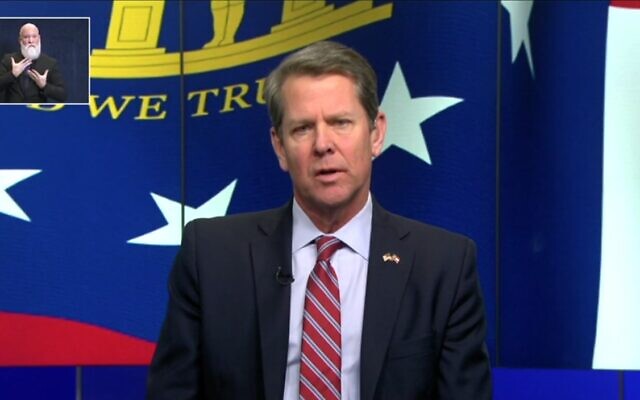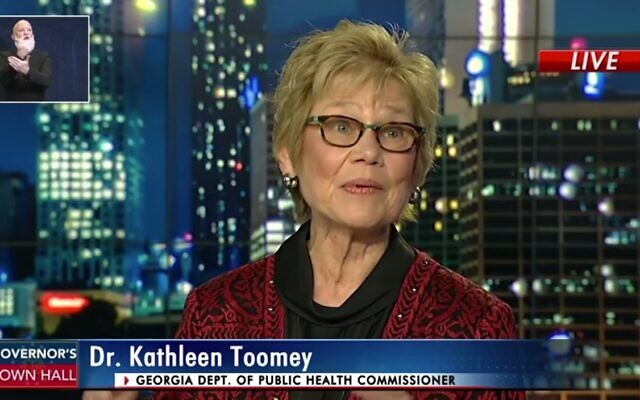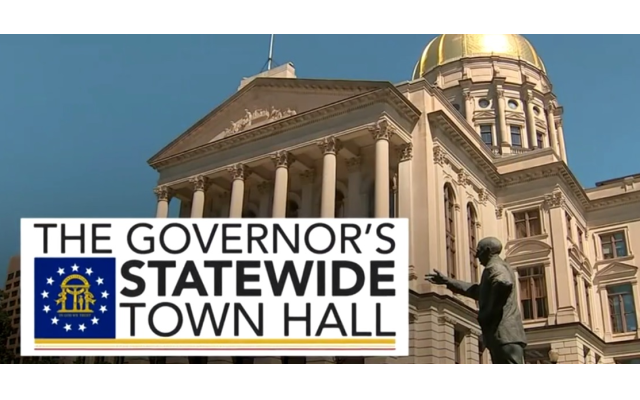COVID-19: Gov. Kemp Holds Statewide Town Hall on Coronavirus
Georgia Governor Brian Kemp states that a Statewide lockdown is a tool still in my tool box.
Dave Schechter is a veteran journalist whose career includes writing and producing reports from Israel and elsewhere in the Middle East.
In a “town hall” aired live Thursday night by seven Atlanta television stations and 18 others statewide, Gov. Brian Kemp made clear that he has heard the calls for a statewide lockdown in response to the COVID-19 coronavirus, but that he is not prepared – yet – to take that action.
“I still have arrows in the quiver, if you will,” Kemp said when asked on early in the hour-long program about why he has not ordered a lockdown, as other states have, and later said, “If we have to do more, I still have that tool in the tool box.”
“I’ve gotten a lot of great advice and I’m making decisions based on that advice,” Kemp said, adding, “But I’m governing the whole state.”
As of Thursday night, the Georgia Department of Public Health reported 1,643 confirmed cases of COVID-19, of which 509 (31 percent) required hospitalization, and 56 deaths linked to the disease. Of an estimated 9,000 people tested statewide, 18.3 percent have reported positive.
The Atlanta Journal-Constitution reported that in metro Atlanta as of 7 p.m. Thursday, one hour before the town hall, Fulton County had reported 231 cases, DeKalb County 137, Cobb County 119, Gwinnett 79.

The governor said that what is an appropriate response in metro Atlanta may not be the appropriate response in, for example, Jeff Davis County, where the number of reported cases is minimal. “I’m having to govern the whole state,” Kemp said. “We still have over 50 counties that don’t have a confirmed case yet. We’re trying to balance that.” Kemp said that 10 of Georgia’s 159 counties account for 60 percent of the confirmed COVID-19 cases in the state.
Kemp made clear that he supports the action taken by local leaders on behalf of their constituencies, such as the more stringent measures ordered by Atlanta Mayor Keisha Lance Bottoms.
For her part, “If it were my call, I would have a stay-at-home order for the entire country, but obviously that is not my call,” Bottoms said, adding, “I understand and respect the governor’s position.”

Dr. Kathleen Toomey, commissioner of the state health department, said the state is making a concerted effort to find supplies and purchase the protective equipment needed for the front-line medical workers. She was unable to give numbers on how many ventilators are available in the state but said an incoming shipment will be directed to hotspots in Rome and Albany.
In response to questions posed by reporters from the local television stations, Kemp said that the measures he has ordered thus far – particularly calling on the “elderly and medically fragile” to shelter in place, and urging Georgians to practice “social distancing” – will help “flatten the curve,” eventually bending the trend line of infection downward. “It’s really up to the public to cut down on the number of people who have to go to the hospital,” he said.
In addition to Kemp, Toomey and Bottom, others answering reporters’ questions were Homer Bryson, head of the state’s emergency management agency; and Georgia Insurance and Safety Fire Commissioner John King (in English and Spanish).
The priority for testing remains the state’s front-line health workers, the governor said. “We have to continue to test more,” Kemp said. He added a complaint that the results of tests still take four or five days to be returned. “We need data back in two days, or one.”
Regarding his order that K-12 schools remain closed through at least April 24, Kemp said that date “gives us enough time to see where the virus is going to go.”




comments